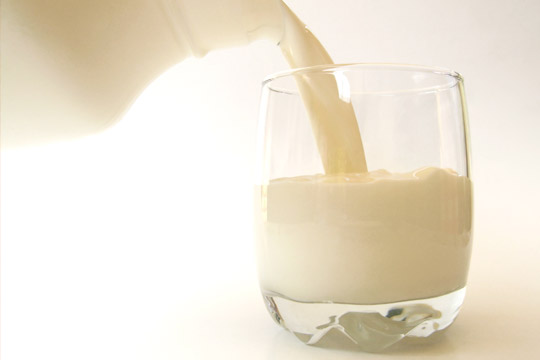
Reducing Food Waste in Foodservice
October 16, 2018 by Doreen Garelick, Dietetic Intern
Our intern Doreen attended a food waste summit for restaurants and compiled these tips to help food service operators redirect…
Nutrition 101
November 6, 2012

Culinary Nutritionist Andrea Canada explains the difference between the ever-growing number of milks and milk substitutes on supermarket shelves.
When it comes to milk, there seem to be endless options in grocery stores these days. Not so long ago, we only had to decide between whole, 2%, 1% or skim, but now there are also milk substitutes like lactose-free milk and a whole variety of plant milks to choose from. In today’s blog post, I’ll cover many of these options and discuss how they compare to help you decide what is the right choice for you.
Cow's milk is the most common animal milk available in store. When sold in grocery stores, it has been pasteurized (heated to kill pathogens) and homogenized (to keep the fat from separating) and is typically offered as whole, 2%, 1% skim and non-fat. While all these varieties of milk contain protein, vitamin A, D, calcium and potassium, the difference between them is in the fat content.
Whole milk can have up to 4% fat by weight and 2%, 1% and skim or non-fat have had some or nearly all of the milk fat removed. Milk fat contains saturated fat so for most adults, 1% or non-fat is a better choice to avoid both extra calories and that less healthy saturated fat. In addition, for those watching their cholesterol intake, unless it’s skim, milk also contains cholesterol.
For more information about cholesterol in all kinds of milks, check out this great blog from Everyday Health. In addition, I don’t recommend flavored milks which typically contain sugars or non-caloric sweeteners and other additives.
Lactose intolerance
The carbohydrate in cow’s milk is lactose. Many adults, especially those of African, Asian or Native American descent, do not make enough of the enzyme lactase, which breaks down lactose in the digestive tract. This condition is known as lactose intolerance and can cause gas, bloating, and other GI discomfort. Milks that have been treated to break down the lactose, such as Lactaid, are good alternatives if lactose is a problem. In addition, Lactaid offers a chewable lactase tablet that someone with lactose intolerance can take before consuming dairy products.
Milk allergy
Different from lactose intolerance, an allergy is an abnormal immune response to the proteins in milk with symptoms ranging from mild to severe. For individuals with a milk allergy, dairy products should be avoided. If not also allergic to soy, soy milk can be an acceptable milk substitute.
Raw milk
There’s quite a bit of controversy surrounding raw milk, and laws governing the sale and purchase of raw milk vary by state. Some feel that the pasteurization and homogenization of commercially sold milk not only kills pathogens but also makes the milk less nutritious and more difficult to digest by denaturing enzymes and killing beneficial bacteria. However, the process of pasteurization ensures milk is one of the safest foods in the grocery store, from a food-borne illness perspective. There have been recalls and illnesses attributed to raw milk, and the CDC states that raw milk is 150 times more likely to make someone sick.
There is a wide variety of plant-based milks that you can find in the grocery store including soy, almond, hemp, sunflower and oat. These are generally acceptable for vegans, free of cholesterol and can provide an interesting flavor element to smoothies, cereal or morning coffee (just remember to add the milk to your cup before the hot coffee, to keep it from separating). Many are fortified with vitamins similar to milk, however it is important to note that soy milk is the only plant milk that has comparable protein to cow’s milk. You should also look out for added sugars and non-caloric sweeteners.
I like to look for plain, unsweetened varieties with as few added ingredients as possible. An additional convenience of plant milks is that many are shelf stable until opened and can be bought in bulk and kept in your pantry until you need them. Plant milks are also great for vegans.
So what to do with all this milk? Here’s a smoothie recipe that uses non-fat milk, however any plain plant milk can be substituted. Enjoy!
¾ cup non-fat milk
1 medium banana, frozen
1 tablespoon peanut butter
1 tablespoon cocoa powder
1 tablespoon ground flax
Blend all ingredients together well and serve.
Makes 1 ¾ cups
Per serving: 327 calories, 14 g protein, 45 g carbohydrate, 12 g total fat, 2 g saturated fat, 7 g fiber, 83 mg sodium, 710 mg potassium

October 16, 2018 by Doreen Garelick, Dietetic Intern
Our intern Doreen attended a food waste summit for restaurants and compiled these tips to help food service operators redirect food waste from landfills.
Nutrition 101

Nutrition 101
September 26, 2018 by Doreen Garelick, Dietetic Intern
Ever notice headlines about rapid weightloss? Dietetic Intern Doreen Garelick looks deeper into a recent eye-catching headline to see if there's any truth behind it.
Connect
 Follow us on Twitter
Follow us on Twitter Friend us on Facebook
Friend us on Facebook Follow us on Pinterest
Follow us on Pinterest Follow us on Instagram
Follow us on Instagram Read our Blog
Read our Blog Watch videos on YouTube
Watch videos on YouTube Watch videos on Vimeo
Watch videos on Vimeo Connect with us on Linkedin
Connect with us on Linkedin Find us on Foursquare
Find us on Foursquare
Tweets by @SPEcertifiedBlog Search
Categories
SPE Certified Newsletter
Sign up for news on the latest SPE-certified venues, events and SPE updates.
We will never share your personal information with a third party.